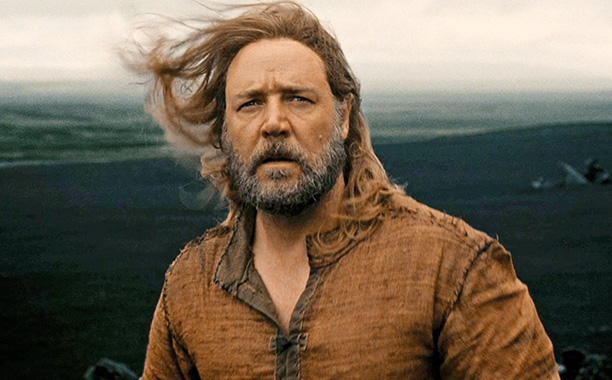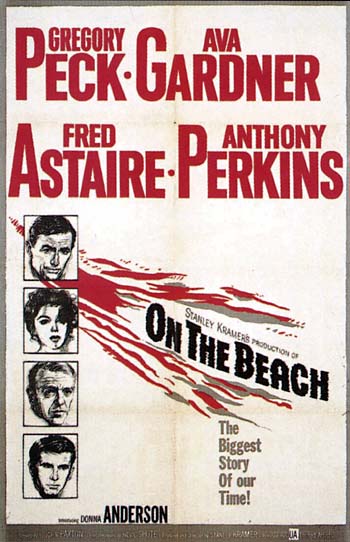
Remember a popular novel from the 1950s titled “On The Beach” by the British-Australian writer Nevil Shute? His real name was Nevil Shute Norway, but he used a pen name for his writings. The novel came out in 1957 and was a dire warning about the perils of nuclear war, and a hit movie by Hollywood film director Stanley Kramer (1913 -2001) was released a few years later.
Some media and cultural observers say that “On The Beach” — both the novel and the subsequent movie — helped wake up the world about the folly of nuclear war in those Cold War days. So could a powerful Nevil Shute-like movie about global warming help change the cultural and political debate over climate issues?
‘On the Beach’ was a story about doomed lovers, written more than 50 years ago and the novel. The movie starring Gregory Peck, Ava Gardner and Anthony Perkins stirred the world’s consciousness about what a so-called ‘nuclear winter’ might look like. So imagine a powerful movie about climate change that could help awaken the world to the dangers of climate change. Think about it: What if there was a ‘cli fi’ novel that was turned into movie that had the power of “On the Beach” and could serve as a wake up call for humankind? Words mattter, novels still matter, movies matter even more.
‘Cli fi’ is a rising new genre of literature and cinema that has received a lot of attention of the past 12 months, most notably from NPR radio and the Guardian newspaper in London. It stands for climate fiction novels or movies, just as sci fi stands for science fiction. Margaret Atwood, the great Canadian writer, has written an oped on ‘cli fi’ recently, too. Some people, like sci fi historian H. Bruc Franklin and novelist Kim Stanley Robinson call cli fi a subgenre of sci fi, and that’s fine, too.
At this point in human history, a movie that explores the human and emotional implications and ramifications of global warming and climate change in a wake up call alarm bell kind of way will go a long way towards awakening humanity to the issues facing the world in the 21st century as we plow along toward the 22nd century. Call the fate that awaits us not “mutually assured-destruction” (MAD) but “climate-assured destruction (CAD). Someone is most likely writing an early draft of his or her screenplay or novel right now. Outlining it, writing a first scene or so, putting it through its paces as it morphs from a mere idea and vision into a full-fledged screenplay, expansive and highly watchable. And with a warning to the world embedded in its pages.
It might be a sci fi movie, or it might be part of this new genre “cli fi.” By the way, Darren Aronofsky is releasing a cli fi movie in late March titled “Noah” that might be the most powerful cli fi film ever produced. It’s about a flood, yes, that flood, a long time ago, like 5,000 years ago in the legends of time. And Christopher Nolan’s “Intersteller” movie, due out in late 2014, will this year’s second cli fi movie, with a theme that directly speaks to climate change and global warming.
‘Sometimes, fiction is the best way to win friends and influence people — H. G. Wells’ ‘The Time Machine’ and George Orwell’s classic, ‘1984’ come to mind,” cli fi novelist John Atcheson, who worked on climate issues in the Clinton administration, told me recently when I asked him about this. ‘Each provoked a visceral reaction that galvanized the culture around it, changing forever the way issues such as class and totalitarianism were perceived. Shute’s ‘On the Beach’ made the consequences of nuclear war real, and therefore, unthinkable.’
‘In a scientifically illiterate culture such as ours, these kinds of myth-based meta-narratives may be the best way to communicate complex scientific issues like climate change,” he added. “Myths, as Bill Moyers and Joseph Campbell revealed, are not necessarily false, nor are they automatically at odds with science. At their best, they provide another way of viscerally experiencing a truth.’
‘A spate of novels and movies that feature climate change as either an overt part of the story-line, or an implicit backdrop against which mythical heroes strive may be creating the critical mass for a cultural awakening that allows climate change to be perceived at that pre-rational level — the kind of limbic awareness that motivates change,” he said. “Or so we can hope.’
Is Hollywood listening?






Climate Debate Needs Film with Power of “On the Beach” – movie news report –
http://talkingfilms.net/climate-debates-need-film-with-power-of-on-the-beach/
#clifi #scifi
Thanks to Danny Bloom for keeping an important conversation going about the danger of climate change! No longer can we hide our heads in the sand about this issue and no longer can we ignore the reality that is happening. It takes creative activists like Danny to force us to do something. I’d love it if one day my climate change themed ebook IN ARK got picked up to be turned into a movie, and who knows — maybe it could be the new ‘On The Beach’. I release IN ARK in April 2014. Find out more about my ebook at: http://www.lisadevaney.com
Go go go Lisa!